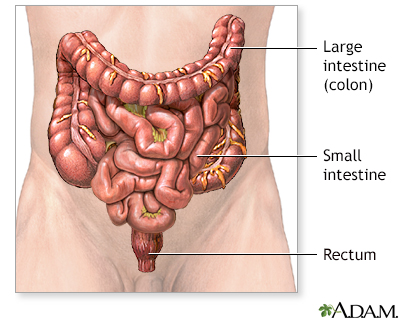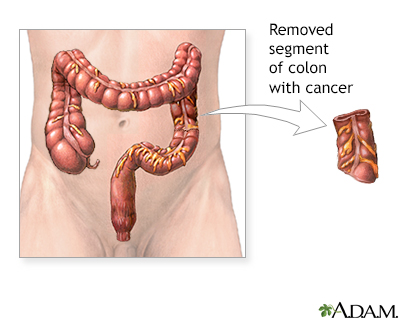Health exams for: #AGEGROUP#
The following exams, tests, and procedures are recommended for #AGEGROUPLOWER#.#FEMALETEXT#
Select a link from the list below to learn how and why each test is performed, as well how to prepare for it.

The following exams, tests, and procedures are recommended for #AGEGROUPLOWER#.#FEMALETEXT#
Select a link from the list below to learn how and why each test is performed, as well how to prepare for it.





The colon, or large intestine, is a muscular tube that begins at the end of the small intestine and ends at the rectum. The colon absorbs water from liquid stool that is delivered to it from the small intestine.
The colon, or large intestine, is a muscular tube that begins at the end of the small intestine and ends at the rectum. The colon absorbs water from ...
Colon cancer is the third most common cancer in the United States. Risk factors include a diet low in fiber and high in fat, certain types of colonic polyps, inflammatory bowel disease (such as Crohn disease or ulcerative colitis), and certain hereditary disorders.
Colon cancer is the third most common cancer in the United States. Risk factors include a diet low in fiber and high in fat, certain types of colonic...
The treatment of colon cancer depends on the stage of the disease. Stage I cancer is limited to the inner lining of the colon; Stage II cancer involves the entire wall of the colon; Stage III cancer has spread to the lymph nodes; Stage IV cancer has spread to other organs (metastasized).
The treatment of colon cancer depends on the stage of the disease. Stage I cancer is limited to the inner lining of the colon; Stage II cancer involv...
Surgery is the main treatment for colon cancer and removal of the involved colon is required. If the cancer is located near the rectum, a colostomy may be necessary. For stage I and II colon cancer, surgery is usually the only treatment. For stage III or IV colon cancer, chemotherapy is necessary after surgery. There is also some suggestion that chemotherapy may also be helpful in some selected stage II patients. Chemotherapy involves a course of drugs which are toxic to cancer cells.
Surgery is the main treatment for colon cancer and removal of the involved colon is required. If the cancer is located near the rectum, a colostomy m...
Stage I and II colon cancer have very high cure rates (60% to 90%); lower cure rates are seen with stage III and IV colon cancer. To detect colon cancer early, when it is most curable, everyone over the age of 55 should have bi-annual endoscopic examinations of the colon.
Stage I and II colon cancer have very high cure rates (60% to 90%); lower cure rates are seen with stage III and IV colon cancer. To detect colon can...
Review Date: 4/18/2023
Reviewed By: John Roberts, MD, Professor of Internal Medicine (Medical Oncology), Yale Cancer Center, New Haven, CT. He is board certified in Internal Medicine, Medical Oncology, Pediatrics, Hospice and Palliative Medicine. Review provided by VeriMed Healthcare Network. Also reviewed by David C. Dugdale, MD, Medical Director, Brenda Conaway, Editorial Director, and the A.D.A.M. Editorial team.



